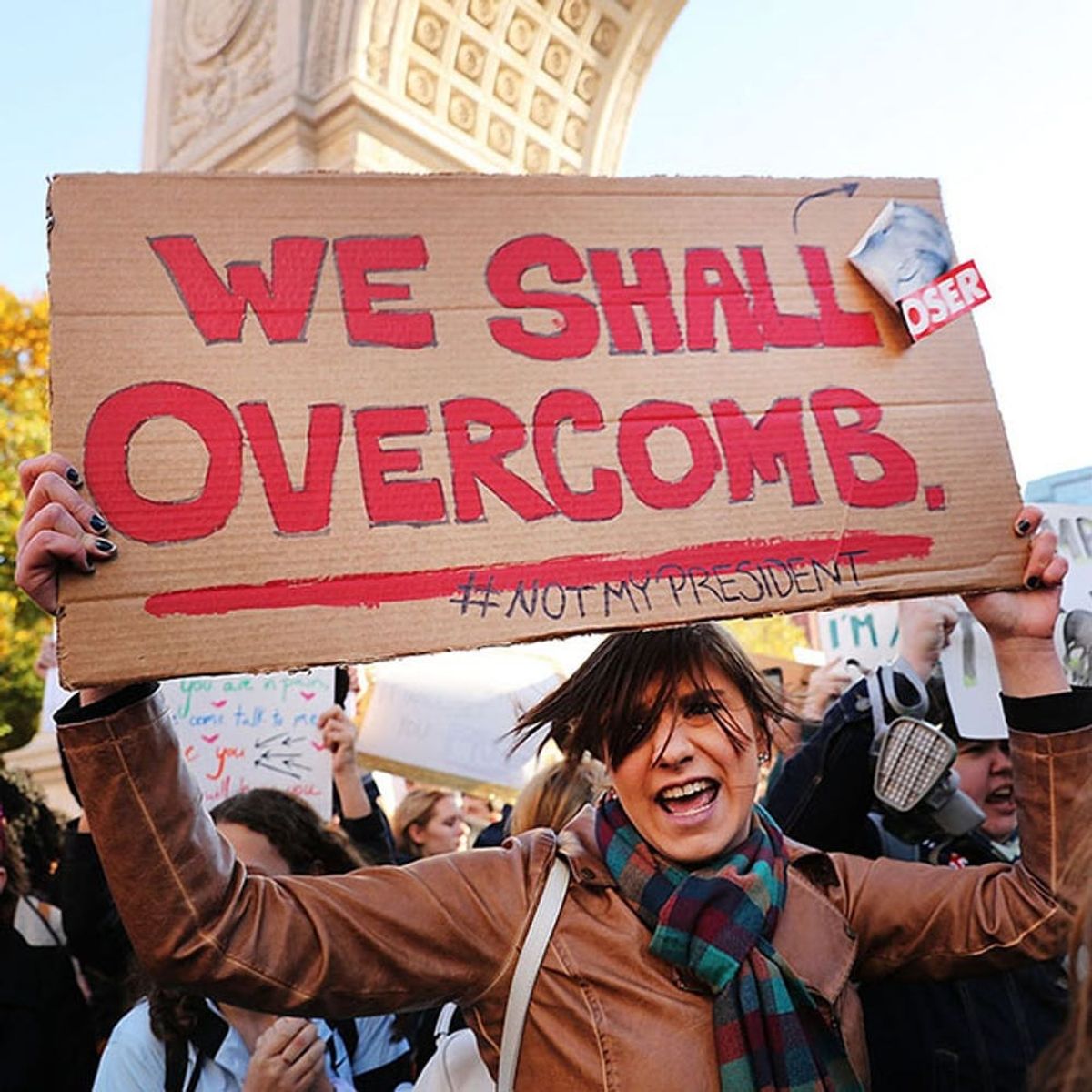A 101 on how to be prepared.
What to Do If You Experience or Witness Post-Election Acts of Hate

This past week has been tumultuous, to say the least. There is a feeling of unrest across the country that has become impossible to ignore. And unfortunately, since Trump’s win, acts of hate and racist slurs have been flooding in from across the country. Two young, male Trump supporters drove through a college in Massachusetts waving a Trump flag and harassing black students. A giant swastika was painted alongside the phrase “Make America White Again” in Wellsville, NY. A Muslim woman had a knife pulled on her by a Trump supporter near Illinois. Derogatory slurs are being thrown about in excess (read a couple of instances here and here). Sadly, we could go on like this with countless other stories that have been reported over just the last 48 hours.
IF YOU’RE A VICTIM OF HARASSMENT
Have a few go-to responses lined up. The Brooklyn Movement Center has created a super useful infographic on how to handle harassment. It offers key actions and things to say if you are being harassed on the street. A few key takeaways: Name the behavior and make a command (“You are harassing me. I don’t appreciate it. Stop.”). Continue asking, “What?” until they become “annoyed by their own voice” and similarly, repeat everything they say back to them very loudly. The last suggestion will bring attention to the situation at hand and hopefully prevent it from escalating.
Use an A-B-C statement.Stop Street Harassment, recommends using a clear A-B-C statement. They write, “Tell the harasser what the problem is; state the effect; and what you want. Here is an example: ‘When you make kissing noises at me it makes me feel uncomfortable. I want you to say, ‘Hello, ma’am,’ from now on if you want to talk to me.’”
Control your temper. This one is straightforward but crucial. When someone is harassing you, often times they are doing it to provoke and get a rise out of you. If you respond with profanity and lose your temper, you’re giving the harasser what he/she wants and might only continue to encourage the behavior.
Brush up on basic self-defense moves. If an altercation gets physical, it’s important to be prepared. If you want to have a few moves mastered, find some online here or find a self-defense course near you here.
Preserve evidence. In an article about how to handle a hate crime, the University of Berkely writes, “Collecting evidence can help you build a case. This can mean: taking photographs, saving written or electronic messages, recording threatening voicemails, not showering after sexual assault (showering washes away evidence), keeping soiled clothes in a plastic sealable bag, keeping a journal of the dates and times of events, etc.”
IF YOU SEE HATE OR HARASSMENT HAPPENING
Have a few go-to tactics prepared: In that same infographic mentioned above, The Brooklyn Movement Center also provides insight on what to do if you witness harassment happening. A couple key tips: Distract the harasser with an unexpected question to throw them off and use an A-B-C type of statement (“You’re calling her a bitch because she didn’t respond to you. That’s wack! You should respect her enough to apologize.”).
Draw attention to the situation. Be loud. The Brooklyn Movement Center even suggests booing the harasser.
Address others directly.United Against Racism recommends addressing third persons directly and individually (“You there, with the green backpack…”) to help assist someone being victimized. By calling bystanders out directly, you increase the chances of getting their help to diffuse the situation.
Report it. This is another obvious but important action. Not only will this assist with help arriving swiftly but a first responder can help you figure out what action is best to take.
Help preserve evidence. Like mentioned above, if you are an eye-witness to an attack, anything you can keep or any details you can recall about the assailant might help later down the line.
PLACES TO CALL, TEXT OR CHAT ONLINE FOR SUPPORT
Should you find yourself a victim of a hateful act or even if you’re feeling in desperate need of guidance, there so many resources that are just a call or click away. Turn to any of these organizations if you need help, counseling or just someone to talk to or text with.
Crisis Text Line: Whatever your issue might be, this text line is only a message away and ready to help.
The National Suicide Prevention Lifeline: If you are having suicidal thoughts or you know someone who is, this line is open 24/7 via call or chat.
VictimConnect: If you’re not sure which helpline is right for you, head to VictimConnect, which can help steer you in the right direction via a phone call or online chat.
Stopping the Hate: This organization provides key tips for the LGBTQIA community. Click through for a number to call.
STOMP Out Bullying: If you are a teen over the age of 13 and experiencing cyberbullying, this organization has an online chat service available to provide guidance and support for victims of all forms of bullying.
(Photo via Getty)


















